 MyDogBreeds
MyDogBreeds Ryukyu Inu is originated from Japan but Alangu Mastiff is originated from Pakistan. Ryukyu Inu may grow 36 cm / 14 inches shorter than Alangu Mastiff. Ryukyu Inu may weigh 65 kg / 143 pounds lesser than Alangu Mastiff. Both Ryukyu Inu and Alangu Mastiff has almost same life span. Both Ryukyu Inu and Alangu Mastiff has same litter size. Both Ryukyu Inu and Alangu Mastiff requires Low maintenance.
Ryukyu Inu is originated from Japan but Alangu Mastiff is originated from Pakistan. Ryukyu Inu may grow 36 cm / 14 inches shorter than Alangu Mastiff. Ryukyu Inu may weigh 65 kg / 143 pounds lesser than Alangu Mastiff. Both Ryukyu Inu and Alangu Mastiff has almost same life span. Both Ryukyu Inu and Alangu Mastiff has same litter size. Both Ryukyu Inu and Alangu Mastiff requires Low maintenance.
 The Ryukyu Inu is a medium-sized dog that comes from Okinawa, Japan.
The Ryukyu Inu is a medium-sized dog that comes from Okinawa, Japan.
It’s a dog that is fairly rare having been used to track boar. There isn’t much information on the dog’s history but after its numbers declined after World War II, there was an urge in the 1980s to save the breed.
The dog isn’t recognized by any major Kennel Clubs.
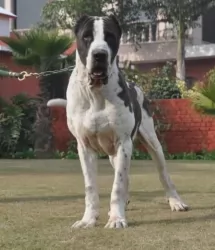 Alangu Mastiff is a breed that ,originates from southern India. Since the very beginning of this breed, it has been used as guard dogs and official dogs of Persian Army. They have been used mostly for wars and as a guard dogs for protection. Also, Alangu Mastiff was used as large gain hunters because of its size and power.
Alangu Mastiff is a breed that ,originates from southern India. Since the very beginning of this breed, it has been used as guard dogs and official dogs of Persian Army. They have been used mostly for wars and as a guard dogs for protection. Also, Alangu Mastiff was used as large gain hunters because of its size and power.
 Japanese dog breeds end with the word ‘Inu’ or ‘Ken’ . It means ‘dog’.
Japanese dog breeds end with the word ‘Inu’ or ‘Ken’ . It means ‘dog’.
The medium sized Ryukyu Inu stands at between 46 to 50cm in height and weighs between 15 to 25kg. He has a black nose, dark brown eyes and erect ears. The tail is long and curls over the back.
The dog’s coat is short and you get the single- and double coated varieties. The coat can be brindle, red, white, liver or black. Some of the dogs have tiger-like stripes in the coat. People are amazed at these dogs as they have incredible climbing abilities and are even capable of climbing a tree.
These dogs are quiet, unobtrusive dogs. The Ryukyu Inu looks very much like a wild dog, which gives the impression of being un-trainable and ferocious but they are easily trained and make splendid pets.
Many people who have had them as pets say they would choose this dog over and over again. They are brave too and get on well with children or pets in the home. They don’t look for trouble, and their kind, stable natures make them excellent therapy dogs.
They’re intelligent dogs and will require plenty of mental and physical stimulation. They will also need to be trained and socialized as they are confident, strong-willed dogs who might not obey you if left to do what they want.
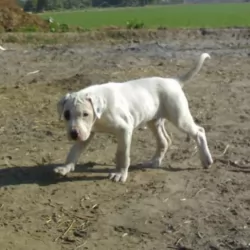 Weight of Alangu Mastiff depends but approximately, male weight is 70-90kg, while females are 60-70kg. While males height is 76-86cm. Females are slightly smaller with an average height of 75-80cm.
Weight of Alangu Mastiff depends but approximately, male weight is 70-90kg, while females are 60-70kg. While males height is 76-86cm. Females are slightly smaller with an average height of 75-80cm.
Lifespan depends drastically on every breed, but it is approximately 8-10 years.
The average litter size of Alangu Mastiff is 6-8 puppies.
Another Name for Alangu Mastiff is Sindh Mastiff.
 This dog has always been a hunting dog so he will want to have his fair share of good exercise – long walks as well as ball and rope games.
This dog has always been a hunting dog so he will want to have his fair share of good exercise – long walks as well as ball and rope games.
He makes a splendid pet because he has an amicable nature wanting to please. He is quiet, loving and loyal, and with such a dog in your home and heart, you just keep discovering what a wonderful pet this 4-legged friend can be.
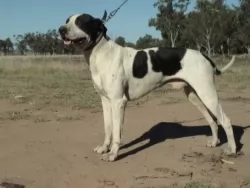 Alangu Mastiff is a very powerful breed. They are a giant breed that is very strong and protective. If you are first time owner, you definitely don’t want this breed as your first pet. They can be very aggressive, and if you are not a dominant owner who knows what he is doing all the time, you can have a lot of troubles with this breed. Alangu Mastiff is a guard dog, and they tend to protect the family no matter what is happening. Of course, with proper care and socialization, they can be wonderful pets that love family, and they can be gentle with children too. Basically, it is very important to socialize them from the earliest age. Alangu is also very hard to train, so you have to be patient and devote a lot of time to train your dog properly. Since they are large dogs, they require a lot of exercises. Walking with the leash is not enough for this breed. They need to run to be fully happy. They can be very aggressive towards other dogs, so it is not very recommendable to spend time with other pets, at least not if they are not socialized. If you train them from an early age, then you should still be careful how your dog behaves around other pets and animals. Don’t get this wrong, Alangu can be a wonderful pet for the whole family, but you have to be careful and well-trained for this breed. They require a lot of attention, patience and time, but overall they can be amazing pets.
Alangu Mastiff is a very powerful breed. They are a giant breed that is very strong and protective. If you are first time owner, you definitely don’t want this breed as your first pet. They can be very aggressive, and if you are not a dominant owner who knows what he is doing all the time, you can have a lot of troubles with this breed. Alangu Mastiff is a guard dog, and they tend to protect the family no matter what is happening. Of course, with proper care and socialization, they can be wonderful pets that love family, and they can be gentle with children too. Basically, it is very important to socialize them from the earliest age. Alangu is also very hard to train, so you have to be patient and devote a lot of time to train your dog properly. Since they are large dogs, they require a lot of exercises. Walking with the leash is not enough for this breed. They need to run to be fully happy. They can be very aggressive towards other dogs, so it is not very recommendable to spend time with other pets, at least not if they are not socialized. If you train them from an early age, then you should still be careful how your dog behaves around other pets and animals. Don’t get this wrong, Alangu can be a wonderful pet for the whole family, but you have to be careful and well-trained for this breed. They require a lot of attention, patience and time, but overall they can be amazing pets.
 These Japanese dogs are thought to be fairly healthy dogs, but like with most other dogs, you would need to be aware of hip dysplasia, bloat, caner and hypothyroidism.
These Japanese dogs are thought to be fairly healthy dogs, but like with most other dogs, you would need to be aware of hip dysplasia, bloat, caner and hypothyroidism.
The Ryukyu Inu, with its 10 to 12 years lifespan, will be prone to minor ailments, but with good care he is not likely to succumb to any of them.
Cataracts have a number of causes in dogs. This disease of the eye can occur at any age, and can develop over weeks or even years.
Cataracts can occur in just one eye or both eyes and a disease such as diabetes can bring on a cataract.
Good nutrition is important for a dog to build a strong immune system, and nutritional supplementation can certainly help to enhance lens health. Cataract surgery can be performed to remove the cataracts.
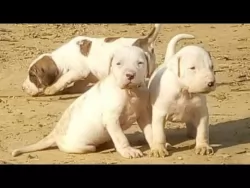 Basically most of the health problems depend on the dog to dog. If you choose puppy carefully, with an adequate examination of professional you will have a healthy dog. Alangu Mastiff is overall healthy breed, but as every other breed, they can develop some issues. Hip dysplasia is can be common for this breed, but again, only if you don’t select your puppy carefully.
Basically most of the health problems depend on the dog to dog. If you choose puppy carefully, with an adequate examination of professional you will have a healthy dog. Alangu Mastiff is overall healthy breed, but as every other breed, they can develop some issues. Hip dysplasia is can be common for this breed, but again, only if you don’t select your puppy carefully.
 The coat of the Ryukya Inu requires brushing twice a week to remove loose hairs. At the same time check your dog over for new lumps and check inside his mouth for bad teeth. Bad teeth can cause lots of pain and toxins within the body. You can also choose to have the teeth seen to and cleaned by your vet.
The coat of the Ryukya Inu requires brushing twice a week to remove loose hairs. At the same time check your dog over for new lumps and check inside his mouth for bad teeth. Bad teeth can cause lots of pain and toxins within the body. You can also choose to have the teeth seen to and cleaned by your vet.
Provide him with his own warm, dry place to sleep.
Provide him with top quality food. There are some excellent commercially manufactured foods on the market that make a point of ensuring good ingredients in them. Your Ryukya Inu needs good food to ensure longevity and health.
Try to include some home-made food for him which can be simply mixed into the dry kibble twice a week. Boiled chicken, brown rice or pasta and spinach, sweet potatoes and carrots is super tasty and nutritious. This food can all be chopped up, refrigerated and added warmed up and in small portions to your pets dry kibble once or twice a week. Your dog will love it.
Ensure there is always a bowl of fresh, cool water within his reach.
Have him neutered or spayed if you aren’t wanting puppies.
Keep his vaccines up to date against some deadly canine diseases.
Get him to the vet when he is injured, in pain or sick.
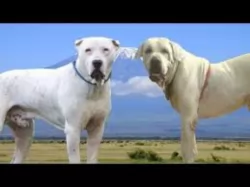 Feeding of your dog highly depends on activity, size, and food that you are feeding your dog. 5-10 cups of high-quality food divided into 2 meals would be enough for an average Alangu Mastiff, but again, you should feed your dog based on activity.
Feeding of your dog highly depends on activity, size, and food that you are feeding your dog. 5-10 cups of high-quality food divided into 2 meals would be enough for an average Alangu Mastiff, but again, you should feed your dog based on activity.
Puppies must eat 3-5 times per day, few cups of high-quality food. They need to eat quality food with a lot of vitamins and minerals to develop into a happy and healthy adult.
Groming is one of the easiest jobs that you should do around your Alangu Mastiff. They are very easy to take care off. Few brushes every now and then would be enough to have perfectly groomed pet. They do not have long coats with a lot of fur so there will be no hair around the house, and maintaining this majestic creature is very easy.